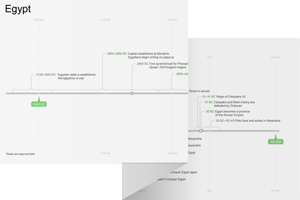40:1–23 While in prison, Joseph interprets dreams for two of Pharaoh’s chief officials. Despite a seemingly bleak outlook for Joseph (see v. 23), his successful interpretations ultimately lead to an encounter with Pharaoh and a promotion (ch. 41). Joseph later interprets his circumstances in Egypt as God sovereignly arranging using particular circumstances to ensure the preservation of his people (see 50:20). |
40:1 after these things While the time frame is not specified here, later chronological references allow for a reconstruction. Two years elapse before Pharaoh has the dream that he calls upon Joseph to interpret (41:1). Joseph is 30 years old when Pharaoh elevates him to high office (41:46), which immediately follows his successful dream interpretation. As a result, Joseph was probably 28 years old when he entered prison. This means he served Potiphar for roughly 11 years (compare 37:2).
the cupbearer of the king of Egypt and his baker These men are the chief officials of their professions in Pharaoh’s household (v. 2).
40:2 Pharaoh This word in Egyptian means “great house.” In Egyptian records, this term is not used of Egypt’s king until the 15th century bc and is not paired with the personal name of the king as a title until roughly the 10th century bc. This means that it is probably supplied here by a later writer or editor.
chief cupbearer A palace official who served Pharaoh’s wine and oversaw his drinking needs. Since this position offered regular opportunities to poison the king, the chief cupbearer had to be highly trustworthy.
chief baker A palace official in charge of Pharaoh’s food.
40:3 the house of the commander of the guard Meaning they are ultimately under Joseph’s care (see Gen 39:22–23; 40:4).
40:5 dreamed a dream Dreams were considered a common mode of divine communication in the ot and the wider ancient Near East (e.g., 20:3; 28:12; 37:5). Joseph affirms this worldview in v. 8—he knows that God is the source of correct interpretation (41:16).
were considered a common mode of divine communication in the ot and the wider ancient Near East (e.g., 20:3; 28:12; 37:5). Joseph affirms this worldview in v. 8—he knows that God is the source of correct interpretation (41:16).
40:8 not interpretations belong to God A sentiment Joseph repeats in 41:16. His experience with dreams (37:5–7, 9) and his confidence in God’s sovereignty prompt his request for Pharaoh to tell his dream.
40:11 Then I placed the cup into the hand of Pharaoh The dream reflects the chief cupbearer’s former occupation, but its imagery puzzles him. Less foreboding than the chief baker’s dream, the chief cupbearer’s vision receives a favorable interpretation.
40:13 will lift up your head The Hebrew phrase used here is a common idiom for showing favor or pardoning someone (compare 2 Kgs 25:27; Jer 52:31).
40:14 bring me out of this house Joseph asks the cupbearer to mention him to Pharaoh. Since the cupbearer was honorable and innocent of any crime, Joseph presumed that Pharaoh would listen to a good report from the trusted servant.
40:15 I was surely kidnapped This indicates either Joseph’s contempt for the circumstances of his arrival in Egypt or his shame regarding being sold into slavery by his brothers.
the land of the Hebrews This probably alludes to the place where the Hebrews have been dwelling—Canaan at large, and the area of Hebron specifically.
40:19 will lift your head from you Joseph repeats the imagery from v. 13, but with a negative connotation. Unlike the chief cupbearer, the chief baker is not restored or pardoned; he is literally lifted off the ground and impaled (v. 22).
birds will eat your flesh from you This would be especially horrible to an Egyptian. Egyptians at this point in history linked preservation of the body to their wellbeing in the afterlife.
40:20 he lifted up the head of See note on v. 13.
40:22 he hanged This could have involved execution followed by the public hanging of a body from a large pole, or the execution itself being carried out by impalement.
40:23 chief cupbearer did not remember Joseph’s request in v. 14 is forgotten, and he remains in prison. Yet the earlier mention of God’s favor with Joseph hints that something good is looming on the horizon, despite the bleak outlook (39:2).

|
About Faithlife Study BibleFaithlife Study Bible (FSB) is your guide to the ancient world of the Old and New Testaments, with study notes and articles that draw from a wide range of academic research. FSB helps you learn how to think about interpretation methods and issues so that you can gain a deeper understanding of the text. |
| Copyright |
Copyright 2012 Logos Bible Software. |
| Support Info | fsb |
 Loading…
Loading…

